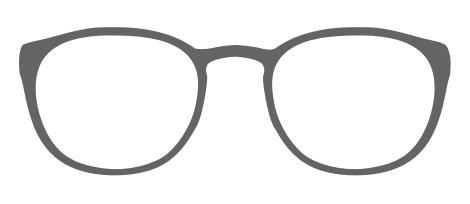As we age our vision inevitably goes through changes. If you’ve had 20/20 eyesight your entire life, eventually you’ll probably notice things getting a tad blurry. Rather than grabbing a pair of cheap readers from your local drugstore, do your peepers a favor and get a proper eye exam. This ensures that you’ll have custom-tailored glasses that work exactly the way your eyes need them to.
After your exam, you’ll definitely have questions about being a first-time eyeglass wearer, and the best place to get these answers is from a trusted optician. We get questions like this almost every day and, over the years, we’ve found that many of them overlap. So, we’ve combed through the most sought-after inquiries we’ve received and compiled them in an easy-to-reference list for you. Keep this handy when you’re ready to pick up your first pair of glasses and you’ll be a pro in no time.
What frame material should I choose for daily use?
The first thing I always respond with is, ‘What is your occupation?’ Depending on what kind of daily activity a person does will help determine the best recommendations. For someone who works in a warehouse, factory or other hard-labor setting, one of the best options for eyewear is a titanium alloy frame or combination such as OVVO or a Flex Titanium. The goal with these is to prevent an easy break on the frame as these are super flexible and made of sturdy material. Believe it or not, we even ask if customers have allergies to metal or issues with weight on their nose. We also go by whether a customer wears plastic or metal sunglasses to determine what may be most comfortable for them.
Why are glasses made with plastic lenses and not glass?
It’s an oxymoron for sure, but there’s good reason for it. First off, plastic is much lighter than glass so they sit more comfortably on our faces. As opposed to glass, plastic is also more shatter resistant making them the safer and more durable option – like polycarbonate lenses. Glass lenses aren’t used by many manufacturers, with the common exception of welding products. In this case, glass will hold up better to constant exposure to high heat and flying sparks.
What’s better, polarized or photochromic lenses?
This is another question that is largely dependent on what a person’s daily activity is like. If you’re in and out of the sun regularly, photochromic lenses are a good idea. With photochromic lenses (most popular brand Transition), you won’t have to change between your glasses and shades every time you go places. However, in most photochromic lenses there is little or no change while driving inside a car as the windshield blocks UV rays preventing the lenses from darkening completely. If you spend most of your time outside in the sun, the polarized lenses are definitely the way to go. They’re also superior for long sunny drives as they’ll protect your eyes as they’ll ward off glaring reflections.
Can I pick any frame to wear with my Rx?
Any frame that is Rx-able, yes. There are some obvious exceptions such as shield frames (any frame that only has one lens extending across to cover both eyes). But, there are some cases where a particular frame may not be the best option. Rimless frames, for example will show the thickness of the lens so if you have a higher Rx, you may not like the way your lenses look. With some plus power prescriptions we may need to make the lenses thicker in order to have required edge thickness for a rimless frames.
What if I want to ditch the glasses and just go for LASIK?
Don’t do it. Sure, LASIK works for some people but we’ve had so many customers come in who’ve gone through the surgery and later needed correction again (and sometimes even again after that). Some other issues include extreme light sensitivity and dry eye. If you really want to go that route do diligent research, and consult your eye doctor.



